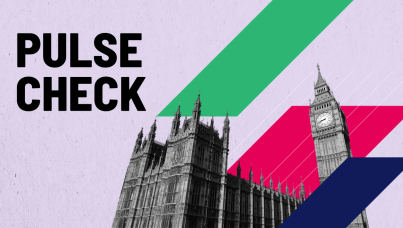Can Reeves Chart a Course Through Economic Pessimism?
I attended the Beyond the Bubble: The Ipsos Spring Statement Briefing webinar, to understand the political climate in Westminster ahead of the Spring Statement. Here’s what I learnt.
The mood in Westminster
Lucy Fisher, Whitehall Editor at The Financial Times, kicked off the webinar by painting a sobering picture of the current political climate. The mood in Westminster, she explained, is fairly gloomy. The government is under criticism from their opponents for losing control of public finances, and has had to make assurances that no new tax rises will be mentioned in the Spring Statement. But even though this is not a full Budget, there will still be lots of speculation about what it reveals about the state of the economy.
Adding to the tension is the expectation of significant spending cuts. The Treasury hasn’t denied reports that the overall spending envelope is going to be reduced, potentially cutting the average spending uplift in Whitehall from 1.3% to 1.1% a year, after the next financial year. This may mean unprotected departments facing reductions of up to 7%, according to the IFS.
This comes at a time when the growth forecast is predicted to be downgraded, interest rates continue to impact the cost of public debt, and global economic concerns could further complicate the UK government’s finances and plans.
However, Lucy believes it’s unlikely that Reeves will deviate from her established fiscal rules, with these forming ‘the bedrock of her own economic credibility’, with spending cuts being the last option available. This is likely to cause concern among Labour’s own backbenchers – as seen in the recent debate over the benefits bill. The government will argue that the cuts are not as big as those seen under the austerity period of the Conservative-Liberal Democrat coalition, but the mood in Whitehall is that there is ‘not a lot of fat to be cut’.
Public Sentiment and Polling
Gideon Skinner, Ipsos' Senior Politics Director, presented Ipsos’ recent polling data, adding a deeper dive into the public's perception of the current economic landscape to this Westminster insight.
Here are some of the key takeaways:
Public pessimism – Ipsos’ Economic Optimism Index stands at -54, the lowest since December 2022, with 67% of Britons expecting the economy to get worse over the next year. This is comparable to the levels of pessimism at the start of Covid and in 2008 after the financial crash. Pessimism also extends to the Spring Statement, with 50% feeling more fearful than hopeful about its likely impact on their personal finances.
Public services – There is widespread dissatisfaction with public services, with three quarters of people believing public services have got worse over the last 5 years. This sentiment is reflected in Ipsos’ latest Understanding Society report, which reveals widespread discontent – and geographical inequalities - across key areas like the NHS, housing, crime, and job provision – available to browse here.
Labour’s challenges – Worryingly for Labour, they are increasingly being held responsible for the poor state of the economy, being blamed also as much as Liz Truss (although not quite as much as the Conservatives as a whole or the Covid pandemic). There is a sense that Labour is not delivering the change that voters hoped for at the time of the election, with expectations of more taxes going up, but belief that these will at least be combined with more money for public services going down. More positively for Labour, they remain the most trusted party on the economy. However their lead is not very convincing, and they need to be aware of the threat from Reform UK who are catching them up as the party the public have most confidence in to deliver the change that Britain needs.
The Chancellor’s options – There are few easy answers in public opinion. The public are split on cutting taxes vs increasing spending on public services, although since the election the public acceptability of higher personal and business taxes has been diminished. Economic growth – and particularly action on the cost of living – remains a top priority for the public, but they also want action to deliver tangible improvements to public services.
A difficult balancing act ahead
The webinar, chaired by Richard Brooks, Director of Media and Partnerships at Ipsos, concluded with a Q&A session, highlighting the difficult balancing act facing Chancellor Reeves.
From this, 3 key takeaways emerged:
- The importance of growth to help Labour deliver its aims for public services. There was a short term cash injection for public services in the last Budget (which our polling shows was mostly welcomed by the public), but Labour is also hoping to see efficiency gains, AI and digitisation, and the use of targets drive improvements. The NHS is the public’s top priority, and Wes Streeting has pointed out that Labour has brought waiting lists down for 5 months in a row, but questions over public services remain.
- Labour’s need to reset the narrative. This means listening to the public and demonstrating that Labour’s plans will not just involve painful choices but will deliver real improvements to the economy, cost of living and public services. It also includes reaching out to business, where relations are not as rosy as they were before the election.
- Balancing act. Reeves faces the unenviable task of navigating competing pressures. Success hinges on her ability to maintain market confidence in the credibility of her economic plans while also containing political fallout from within her own party, business and the public at large if she has to signal that there are still more painful decisions to come.
The Spring Statement will be an important moment for Chancellor Reeves and the Labour government. Labour still has time to deliver before the next election, but with public sentiment already fragile, the Chancellor must tread carefully, with choices that will shape the future of the UK’s economy, public services, and the government’s own fortunes.







